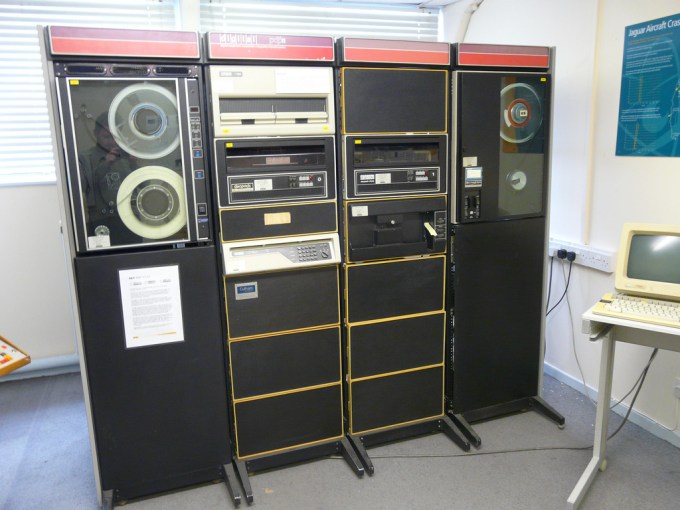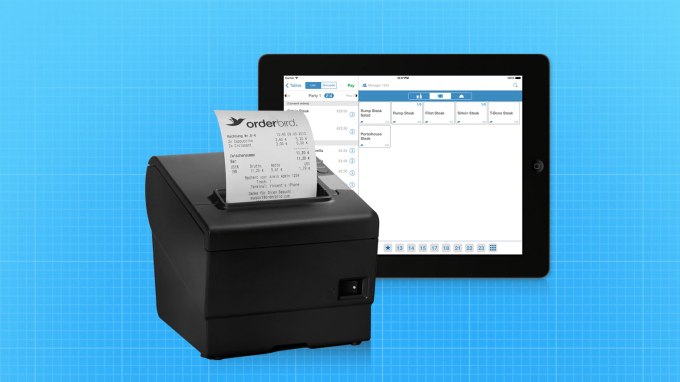 Enterprise IT is undergoing a platform shift from web-based, client-server systems to a mobile-cloud platform. This shift has caught the attention of all the major tech vendors who have either acquired or launched Platform as a Service (PaaS) or Backend as a Service (BaaS) technologies to address this growing opportunity. Facebook acquired Parse, PayPal bought StackMob, Salesforce launched… Read More
Enterprise IT is undergoing a platform shift from web-based, client-server systems to a mobile-cloud platform. This shift has caught the attention of all the major tech vendors who have either acquired or launched Platform as a Service (PaaS) or Backend as a Service (BaaS) technologies to address this growing opportunity. Facebook acquired Parse, PayPal bought StackMob, Salesforce launched… Read More
15
2014
The New Mobile-Cloud Enterprise
15
2014
How to close POODLE SSLv3 security flaw (CVE-2014-3566)
Padding Oracle On Downgraded Legacy Encryption
 First off, the naming “convention” as of late for security issues has been terrible. The newest vulnerability (CVE-2014-3566) is nicknamed POODLE, which at least is an acronym and as per the header above has some meaning.
First off, the naming “convention” as of late for security issues has been terrible. The newest vulnerability (CVE-2014-3566) is nicknamed POODLE, which at least is an acronym and as per the header above has some meaning.
The summary of this issue is that it is much the same as the earlier B.E.A.S.T (Browser Exploit Against SSL TLS), however there’s no known mitigation method in this case – other than entirely disabling SSLv3 support, in short, an attacker has a vector by which they can retrieve the plaintext form your encrypted streams.
So let’s talk mitigation, the Mozilla Security Wiki Serverside TLS has for some time made strict recommendations of ciphers and protocols; and is certainly worth your attention.
Apache
Disable SSLv2 and SSLv3 in your ssh apache configuration by setting:
SSLProtocol all -SSLv2 -SSLv3
Nginx
Allow support only for TLS in Nginx with the following:
ssl_protocols TLSv1 TLSv1.1 TLSv1.2;
MySQL
This is where things get far more interesting; unlike Apache and Nginx there’s no way to allow / disallow entire protocols of the SSL / TLS spec within mysql; there is however the ability to specify the cipher spec to be used in SSL communication.
As such to remove SSLv3 support from MySQL you need only ensure that none of the SSLv3 ciphers are in use wihtin your configuration.
As per information in this bug you can find a list of SSLv3 ciphers by simply
openssl ciphers -v 'DEFAULT' | awk '/SSLv3 Kx=(RSA|DH|DH(512))/ { print $1 }'
DHE-RSA-AES256-SHA
DHE-DSS-AES256-SHA
DHE-RSA-CAMELLIA256-SHA
DHE-DSS-CAMELLIA256-SHA
AES256-SHA
CAMELLIA256-SHA
EDH-RSA-DES-CBC3-SHA
EDH-DSS-DES-CBC3-SHA
DES-CBC3-SHA
DHE-RSA-AES128-SHA
DHE-DSS-AES128-SHA
DHE-RSA-SEED-SHA
DHE-DSS-SEED-SHA
DHE-RSA-CAMELLIA128-SHA
DHE-DSS-CAMELLIA128-SHA
AES128-SHA
SEED-SHA
CAMELLIA128-SHA
RC4-SHA
RC4-MD5
EDH-RSA-DES-CBC-SHA
EDH-DSS-DES-CBC-SHA
DES-CBC-SHA
EXP-EDH-RSA-DES-CBC-SHA
EXP-EDH-DSS-DES-CBC-SHA
EXP-DES-CBC-SHA
EXP-RC2-CBC-MD5
EXP-RC4-MD5
Removing the above form your ssl-cipher configuration should disable SSLv3 support; of course ensuring your MySQL service is NOT generally accessible is by far one of the most important steps you can take in securing your MySQL deployment against CVE-2014-3566.
You can read more about POODLE here.
The following script will help to identify support for any none SSLv3 ciphers; unfortunately in my limited testing I have yet to have found a supported none SSLv3 cipher.
Formatting is an issue for the script as such please see the Github gist
UPDATE 2014-10-16: openssl updates are now becoming available with patches against this issue
AMI Linux: openssl-1.0.1j-1.80.amzn1 “add patch for CVE-2014-3566 (Padding Oracle On Downgraded Legacy Encryption attack)”
RedHat: no update is yet available
The post How to close POODLE SSLv3 security flaw (CVE-2014-3566) appeared first on MySQL Performance Blog.
15
2014
Talking Drupal #068 It’s Just One Line
Topics
- Security Patch Released today
- Approaches to address the issue. Update or patch.
- Handling customers
- Open source – security
- Oomph Ally Services
- Managing the update process with a customer
- Charge for updates or included in monthly service fee
- Writing secure code: Importance of using the API
Modules
Conditional Fields https://www.drupal.org/project/conditional_fields
Define dependencies between fields based on their states and values.
Conditional Fields for Drupal 7 is an user interface to the new States API, plus the ability to modify fields appearance and behavior on certain conditions when viewing content
Resources
- Security Release – https://www.drupal.org/SA-CORE-2014-005
- Security FAQ – https://www.drupal.org/node/2357241
- Drupal Secutiry Page – https://security.drupal.org/about
- Oomph Ally Servcies – http://oomphinc.com/ally
- Drupal Security – https://twitter.com/drupalsecurity
Hosts
- Stephen Cross – www.ParallaxInfoTech.com @stephencross
- Jason Pamental – www.hwdesignco.com @jpamental
- John Picozzi – www.oomphinc.com @johnpicozzi
- Nic Laflin – www.nLightened.net @nicxvan
15
2014
Talking Drupal #068 It’s Just One Line
Topics
- Security Patch Released today
- Approaches to address the issue. Update or patch.
- Handling customers
- Open source – security
- Oomph Ally Services
- Managing the update process with a customer
- Charge for updates or included in monthly service fee
- Writing secure code: Importance of using the API
Modules
Conditional Fields https://www.drupal.org/project/conditional_fields
Define dependencies between fields based on their states and values.
Conditional Fields for Drupal 7 is an user interface to the new States API, plus the ability to modify fields appearance and behavior on certain conditions when viewing content
Resources
- Security Release – https://www.drupal.org/SA-CORE-2014-005
- Security FAQ – https://www.drupal.org/node/2357241
- Drupal Secutiry Page – https://security.drupal.org/about
- Oomph Ally Servcies – http://oomphinc.com/ally
- Drupal Security – https://twitter.com/drupalsecurity
Hosts
- Stephen Cross – www.ParallaxInfoTech.com @stephencross
- Jason Pamental – www.hwdesignco.com @jpamental
- John Picozzi – www.oomphinc.com @johnpicozzi
- Nic Laflin – www.nLightened.net @nicxvan
14
2014
Rackspace doubling-down on open-source databases, Percona Server
 Founded in 1998, Rackspace has evolved over the years to address the way customers are using data – and more specifically, databases. The San Antonio-based company is fueling the adoption of cloud computing among organizations large and small.
Founded in 1998, Rackspace has evolved over the years to address the way customers are using data – and more specifically, databases. The San Antonio-based company is fueling the adoption of cloud computing among organizations large and small.
Today Rackspace is doubling down on open source database technologies. Why? Because that’s where the industry is heading, according to Sean Anderson, Manager of Data Services at Rackspace. The company, he said, created a separate business unit of 100+ employees focused solely on database workloads.
The key technologies under the hood include both relational databases (e.g., MySQL, Percona Server, and MariaDB) and NoSQL databases (e.g., MongoDB, Redis, and Apache Hadoop).
Last July Rackspace added support for Percona Server and MariaDB to their Cloud Databases DBaaS (Database-as-a-Service) product, primarily at the request of application developers who had been requesting more open source database support options.
Matt Griffin, Percona director of product management, and I recently sat down with Sean and his colleague Neha Verma, product manager of Cloud Databases. Our discussion focused on the shift to DBaaS as well as what to expect in the future from Rackspace in terms of Cloud Databases, OpenStack Trove and more.
* * *
Matt: Why did you expand the Cloud Databases product this past summer?
Sean: We launched cloud databases about a year and a half ago. Since then we’ve rolled feature after feature (backups, monitoring, configuration management, etc…) focused on simplifying our customers life, this backed by Fanatical support has made the product easier to use and more production ready than ever. We understand that features aren’t enough so in addition to all the features we have also made significant improvements to the hardware and network infrastructure. All this means that we’ve been very busy not just expanding the offering but also making the offering simpler to use, more complete and more scalable.
Our vision is to offer a robust platform that with the most popular Big Data, SQL, and NoSQL databases on dedicated, bare metal, and public cloud infrastructure.
Matt: What type of customer is your Cloud Databases offering aimed at?
Sean: Currently we have a variety of customers running multiple Cloud Database instances ranging from customers running a two-month marketing campaign to customers running web applications, ecommerce applications with highly transactional database workloads. Our customers prefer the simplicity and reliability of the service which allows them to focus on their business and not worry about the heavy lifting associated with scaling and managing databases.
Matt: How is your Cloud Databases offering backed-up?
Neha: We use Percona XtraBackup to perform a hot copy of all databases on a instance and then stream the backups to Cloud Files for storage. A customer can anytime restore the backup to a new instance. Percona XtraBackup is the only option we offer customers right now.
Tom: In terms of security, how do you address customer concerns? Are cloud-based open source databases more secure?
Sean: Data security concerns are at an all-time high and we have a number of up and coming features that continue to address those concerns. Today we offer a number of unique features specifically Cloud Databases can only be accessed on the private network so the database can only be accessed by systems on your private network. Additionally, we support SSL for communication between user application and database instance so that any data transfer is encrypted in transit. These features along with the built in user controls and authentication mechanisms help significantly address customers security concerns. Ultimately Cloud-based open source databases or no more or less secure than any other database, security is about more than features it is about the process and people that build and manage your database and we have those more than covered.
Matt: Is this for production applications or pre-production?
Sean: It’s very much production capable. While there’s a perception that this type of offering would only fit for use cases around test or dev, the truth is we are running hundreds of very large, fully managed instances of MySQL on the cloud. We don’t make any delineation between production or pre-production. However, we’re definitely seeing more and more production workloads come onto the service as people are getting educated on the development work that we’ve done around adding these new features. Replication and monitoring are the two most popular right now.
Matt: How are people accessing and using it?
Sean: A majority of our users either access the database via the Control Panel, API or a command-line utility.
Matt: Since the launch, how has the reaction been?
Sean: The reaction from the press standpoint has been very positive. When we talk with industry analysts they see our commitment to open source and where we are going with this.
 Tom: How committed is Rackspace to OpenStack?
Tom: How committed is Rackspace to OpenStack?
Sean: We all live in OpenStack. We have tons of Rackers heading to the upcoming OpenStack Paris Summit in November. We’re looking forward to many years of contributing to the OpenStack community.
Tom: Last April, Rackspace hosted several sessions on OpenStack and Trove at the Percona Live MySQL Conference and Expo 2014 in Santa Clara, Calif. What are you looking forward to most at Percona Live 2015?
Sean: For us, Percona Live is about listening to the MySQL community. It’s our best opportunity each year to actually setup shop and get to learn what’s top of mind for them. We then can take that information and develop more towards that direction.
Tom: And as you know we’re also launching “OpenStack Live” to run parallel to the Percona Live MySQL conference. OpenStack Live 2015 runs April 13-14 and will emphasize the essential elements of making OpenStack work better with emphasis on the critical role of MySQL and the value of Trove. I look forward to hearing the latest news from Rackspace at both events.
Thanks Sean and Neha for speaking with us and I look forward to seeing you this coming April in Santa Clara at Percona Live and OpenStack Live!
On a related note, I’ll also be attending Percona Live London (Nov. 3-4) where we’ll have sessions on OpenStack Trove and everything MySQL. If you plan on attending, please join me at the 2014 MySQL Community Dinner (pay-your-own-way) on Nov. 3. (Register here to reserve your spot at the Community Dinner because space will be limited. You do not need to attend Percona Live London to join the dinner).
The post Rackspace doubling-down on open-source databases, Percona Server appeared first on MySQL Performance Blog.
14
2014
Meta-Post: New Mascot, New Language, New Database
It has been quiet here at the Use The Index, Luke blog lately. But that’s not because I’ve run out of topics to write about — in fact, my blog backlog seems to be ever growing — the recent silence is just because there are some more demanding projects happening at the moment.
First of all, Use the Index, Luke got a new mascot—not exactly breaking news. However, I’m currently preparing give-aways and merchandise products featuring the new mascot. Stay tuned.
Next, Use The Index, Luke gets translated to Japanese! The first two chapters have just been published. Insiders will remember that chapter 1 and 2 make up half of the book. The translation is done by Hayato Matsuura, Takuto Matsuu has a second look over it. As far as I can tell both are making a great job and I’d like to be the first to thank them! Please help spreading the word about this in the Japanese community.
Finally, I’m just adding DB2 as a first-class citizen to Use The Index, Luke because a client wanted to get my SQL performance training based on DB2 LUW Express-C (which is free, by the way). Like the Japanese translation, this work is not yet finished. However, the appendix on execution plans is already there. Again, please help spreading the word about this in the DB2 community.
That’s it. I just wanted to give you a short update.
Original title and author: “Meta-Post: New Mascot, New Language, New Database” by Markus Winand.
14
2014
EMC Cloudscaling Purchase Is One More Attempt To Stay Relevant
 While rumors have been flying that EMC has been trying to execute a merger with fellow computing giant HP, it threw a bit of a curve this week when it bought cloud startup Cloudscaling. Just when you’re thinking EMC might be irrelevant, it makes a move that suggests the company is still forging ahead. While EMC is at its core a storage company, it owns lots of enterprise pieces and… Read More
While rumors have been flying that EMC has been trying to execute a merger with fellow computing giant HP, it threw a bit of a curve this week when it bought cloud startup Cloudscaling. Just when you’re thinking EMC might be irrelevant, it makes a move that suggests the company is still forging ahead. While EMC is at its core a storage company, it owns lots of enterprise pieces and… Read More
14
2014
HighQ Takes On The Enterprise Collaboration Space With An Eye Toward Data Sovereignty
 London-based HighQ is opening a new data center in Australia, growing its bid to provide locally supported enterprise collaboration and file-sharing products. The company has quickly expanding revenues, and a key offering: If you use HighQ, the U.S. government will likely have a harder time than usual getting its hands on your data than if you use a U.S.-based provider. Read More
London-based HighQ is opening a new data center in Australia, growing its bid to provide locally supported enterprise collaboration and file-sharing products. The company has quickly expanding revenues, and a key offering: If you use HighQ, the U.S. government will likely have a harder time than usual getting its hands on your data than if you use a U.S.-based provider. Read More
14
2014
Google For Work Gets New Support Options
 It’s not always easy to get support from Google (just ask anybody who ever had his AdSense account suspended for nebulous reasons), but over the course of the last few years, the company has slowly expanded its customer support programs, especially for its paid productivity services. More than two years ago, for example, the company launched 24/7 phone support for Google Apps subscribers. Read More
It’s not always easy to get support from Google (just ask anybody who ever had his AdSense account suspended for nebulous reasons), but over the course of the last few years, the company has slowly expanded its customer support programs, especially for its paid productivity services. More than two years ago, for example, the company launched 24/7 phone support for Google Apps subscribers. Read More
14
2014
Berlin’s Orderbird, A Tablet-Based Sales Platform, Orders Up Another $10M
 Companies like Square, Groupon, PayPal and Amazon are all vying to be the primary tech partner for merchants at the point of sale in the U.S., and as more companies replace their legacy equipment with low-cost tablets, the race is heating up elsewhere, too. Orderbird, a startup out of Berlin, is today announcing a further round of $10 million to continue building out its own tablet-based… Read More
Companies like Square, Groupon, PayPal and Amazon are all vying to be the primary tech partner for merchants at the point of sale in the U.S., and as more companies replace their legacy equipment with low-cost tablets, the race is heating up elsewhere, too. Orderbird, a startup out of Berlin, is today announcing a further round of $10 million to continue building out its own tablet-based… Read More